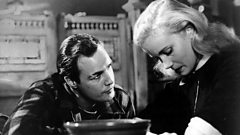On The Waterfront
Paul Gambaccini on Best Picture Oscar for Marlon Brando’s On The Waterfront and what it says about society in 1954. From 2013.
Paul Gambaccini is back with the series revealing how some of the greatest Best Picture Oscar winning films were made - and what they tell us about the history of the time.
The 27th Academy Awards, for films released in 1954, were dominated by 'On The Waterfront', a gritty, black and white masterpiece, set at the highly unionised New Jersey docks, then controlled by the mob.
A real tale of corruption and murder on the waterfront is transformed into a fiction - as a simple minded ex-boxer, played by Marlon Brando, wrestles with his conscience as he turns informer to win the girl he loves.
This film not only gives us the most famous scene ever to take place in the back of a taxi, ("I coulda been a contender!"), it also showcases the talents of director Elia Kazan, and an astonishingly strong support cast - Rod Steiger, Karl Malden, Lee J Cobb and newcomer Eva Marie Saint- Method Acting at its height.
It also marks the end of the powerful team of director Elia Kazan and Method actor Marlon Brando - blown apart by Brando's horror at Kazan's decision to testify in front of the House Un-American Activities Committee, HUAC - then investigating the red-scare in Hollywood.
Is it a coincidence that ‘On the Waterfront’ tells the story of a man who informs - snitches on his friends - but holds the moral high ground?
Featuring a rich mix of archive and original interviews with actors, screen writers and film critics, and a revelatory interview with Thomas Hanley, a real life longshoreman who played Brando's young friend Tommy back in 1954.
Producer: Sara Jane Hall
First broadcast on �������� Radio 4 in February 2013.
Last on
More episodes
Previous
You are at the first episode
Clip
-
![]()
On The Water Front
Duration: 01:00
Broadcasts
- Sat 2 Feb 2013 10:30�������� Radio 4
- Fri 11 Mar 2022 18:30�������� Radio 4 Extra
- Sat 12 Mar 2022 00:30�������� Radio 4 Extra
- Fri 23 Feb 2024 21:00�������� Radio 4 Extra



